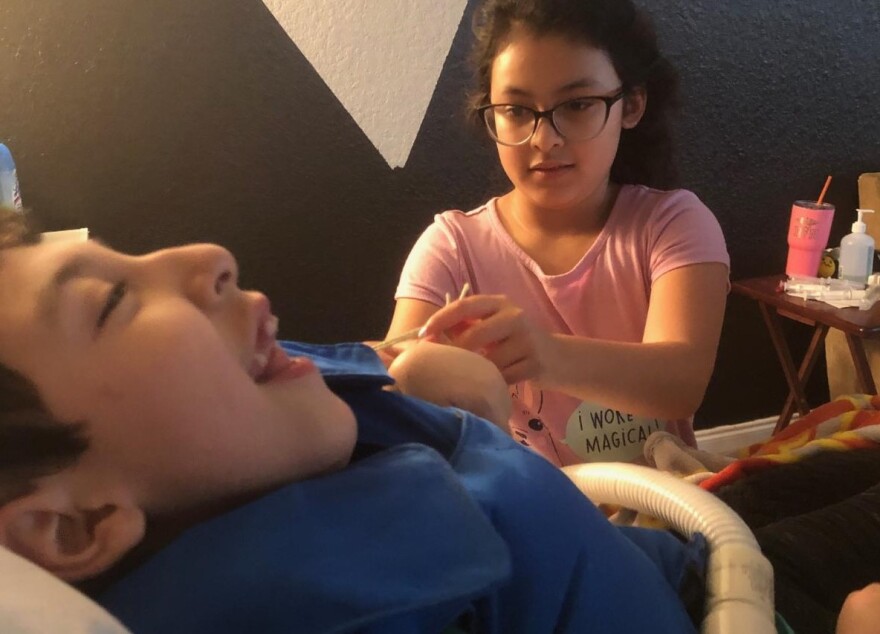The daily lines surrounding local grocery stores have challenged San Antonians for more than a week. For Ryan Pflipsen who suffers from Spina Bifida — it’s more than an annoyance, it’s an impossibility. He called the nerves along his back “ a frayed wire.” The birth defect prevented many of his spinal nerves from developing properly, necessitating crutches to walk.
“To stand on my crutches for a very long period of time…It would just be physically draining,” said Pflipsen. “It would wipe us out for the whole day, we'd come home and we'd crash basically.”
For Pflipsen and his wife — who suffers from the same curvature of the spine — the current pandemic has thrown their lives into disorder.
COVID-19 affects everyone’s lives, with stores and services closing and governments asking people to remain home. But while able-bodied people can pivot easily and use workarounds the impacts on people with disabilities are often much more complicated and often go unseen.

For many of the one in seven San Antonians living with a disability, the pandemic has made transportation perilous, and access to food, medical supplies and services questionable.
Rather than stand in a line to get into H-E-B, Pflipsen has tried delivery services from the local grocery store, but like many across the city, he is finding basic staples left out.
Then there’s restaurant delivery.
“We can afford a little expense but these other friends of ours that are on more limited income than we are, can't afford to be doing the traditional Uber Eats and or favor and paying 15-20 bucks for a meal every night.”
More than 80% of the disabled community is unemployed, relying on a fixed income, according to the Bureau of Labor Statistics.
Pflipsen and many in the disabled community were heartened to see H-E-B offer seniors exclusive entry to stores to reduce the risk to that vulnerable group. They hope it is offered to people with disabilities too.
For Michael Guajardo the big challenge is transportation. He works for The Lighthouse for the Blind, directing their assistive technology program.
He can use VIA trans, which serves the disabled, or Uber and Lyft — but he's worried.
“Honestly I mean, you don't know what sort of actions they might be taking in terms of trying to wipe things down, disinfect things,” he said.

But for many severely disabled, the concern extends to access to services and medical supplies.
COVID-19 has upended the treatment of Traci Lewand’s son, Mason. The 7-year-old is extremely immunosuppressed and regularly has respiratory problems.
His parents canceled therapies that would have required him to go to a clinic, like physical therapy. They canceled his in-home teacher. They even changed how his in-home nurses enter the house.
Lewand narrated the process while on the phone with TPR.
Health workers now travel through the garage, into the house’s mudroom.
“In the mudroom, we've changed it into a changing room,” she said.
“They sanitize their hands. They remove their clothes. They put on the clothes they’ve left here that we’ve already washed and laundered,” she said.
Eventually they end up in Mason’s room.
“Can you say hi to everybody,” Lewand asked.
Mason responded with a groan and eventually a smile.
He suffers from bilateral schizencephaly. He had a stroke in utero and was born with a quarter of his brain. It left him blind and nonverbal.
When Mason is unhappy he clenches his fists and raises his arms. That wasn’t his mood on this day. He had lots of belly laughs and smiles.
Lewand said that day was a good day for him. He had far fewer seizures than previous days.

For Mason the self-quarantine has meant more time with Mom and also with his sister — who had to stop working at a local gym — and grandma, who until the pandemic was active as a massage therapist.
“And I do think though that Mason probably thinks this is the longest weekend that's never ending,” Lewand said.
Mason recently had brain surgery putting him at additional risk of disease. He is so susceptible to the disease that these moments were captured by Lewand and TPR didn’t ever go to their house.
“It’s really shrunken the circle and the bubble that we’re living in,” she said.
Finding nurses hasn’t been an issue yet, but — because of supply shortages — Lewand said their nursing agency couldn’t provide masks, disinfecting wipes or gloves any more.
“I see so many people freaking out about toilet paper, and I'm like, I'm not worried about toilet paper,” Lewand said.
“I'm worried about the ability to wipe down all my son's medical equipment that the nurses have gloves in order to care for him, you know, and not transmit from one person to the other.”
They have enough masks, but they are going through them quickly. It isn’t clear what they would do if they ran out of any of these supplies.
The pandemic hasn’t showed signs of slowing down in the U.S., and many in the disabled community are hunkering down for an uncertain future.
Paul Flahive can be reached at Paul@tpr.org or on Twitter @paulflahive.



